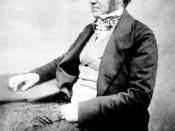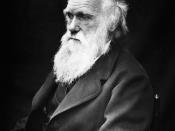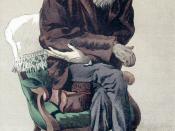In acknowledgment of the universal accomplishments of Charles Robert Darwin, his noble face is printed on English ten pound note crumpled in wallets country-wide. And yet, his fantastic achievements in the field of science have always deemed him the foil of philosophy and traditional aesthetics. Contrary to this popular assumption, 'The Origin of Species' is not only a colourfully and intimately written book, with poetic flashes of feeling and an intelligent style; it is a philosophy. As a re-evaluation of nature and man's place within, it not only tracks the past, the present, and how we should understand them, but looks to the future confidently, in the direction his theory dictates. At first glace, Romanticism seems the direct opposite to Darwinism, the Romantic conception and veneration of nature, created by God and presided over by humans, seems utterly irreconcilable with the 'survival of the fittest' concept attributed (though this simplification was not Darwin's words) to Darwinism.
But this is a misconception by those who have not read, or have misunderstood, 'The Origin of Species'. I believe Darwin has, here, created a kind of 'neo-Romanticism' based on reason and scientific understanding rather than religion, art and imagination.
'The Origin of Species' is written autobiographically, a frank introduction initiates a very personal, insightful style based on feelings, sensations, experience and logic. Lacking the scientific evidence of genetics to back his theory, the book concentrates on his experiences of nature, and details the deductions he made from the lengthy period where he was researching, outside in nature. In this approach, he is not too far removed from the Romantics. Nevertheless, the basic conclusions he draws are exceedingly different. The theory of survival of the fittest regards nature as a chaotic battle-zone, fighting and struggling, death and...



Excellent
Well argued essay and bery interesting.
1 out of 1 people found this comment useful.